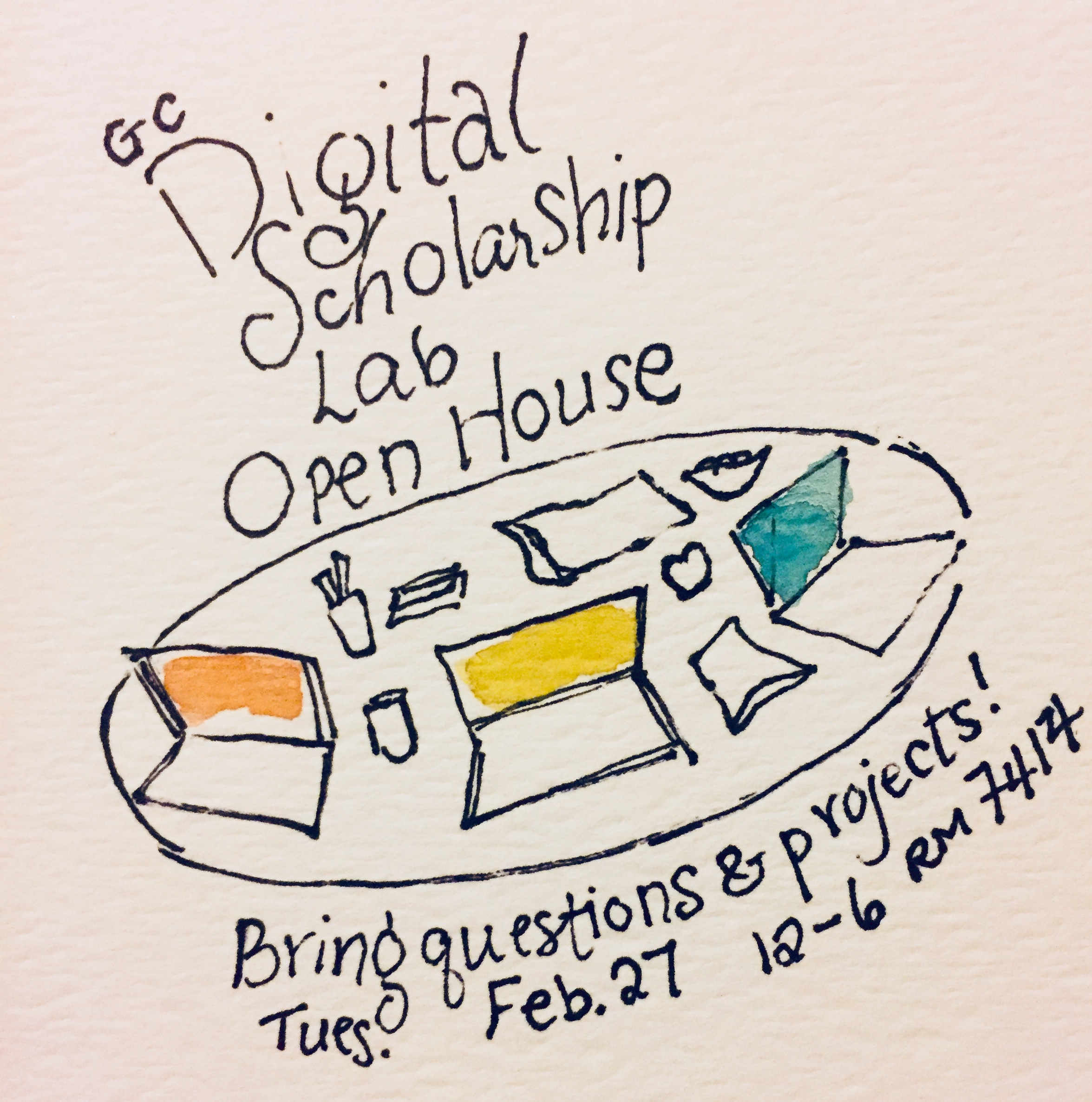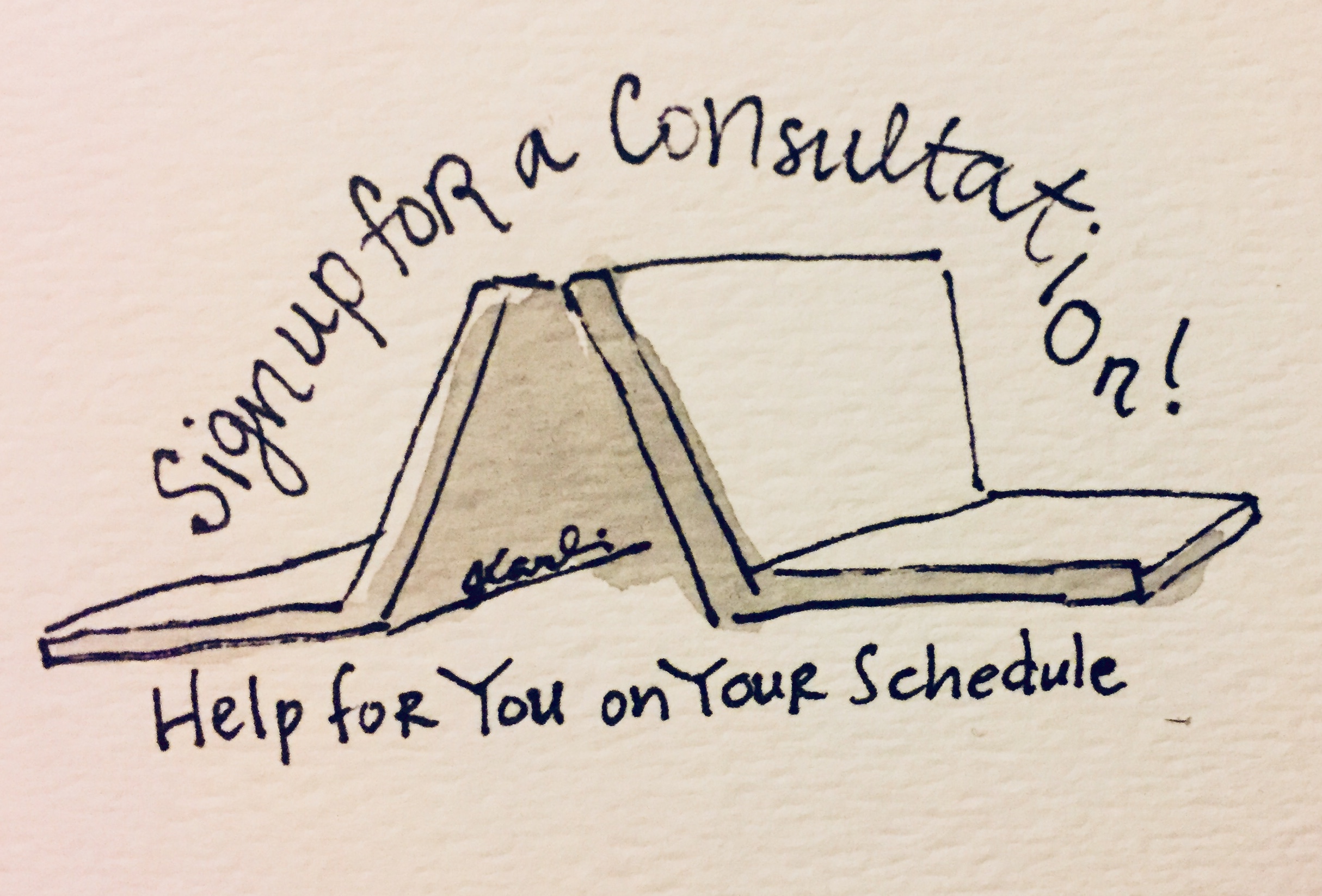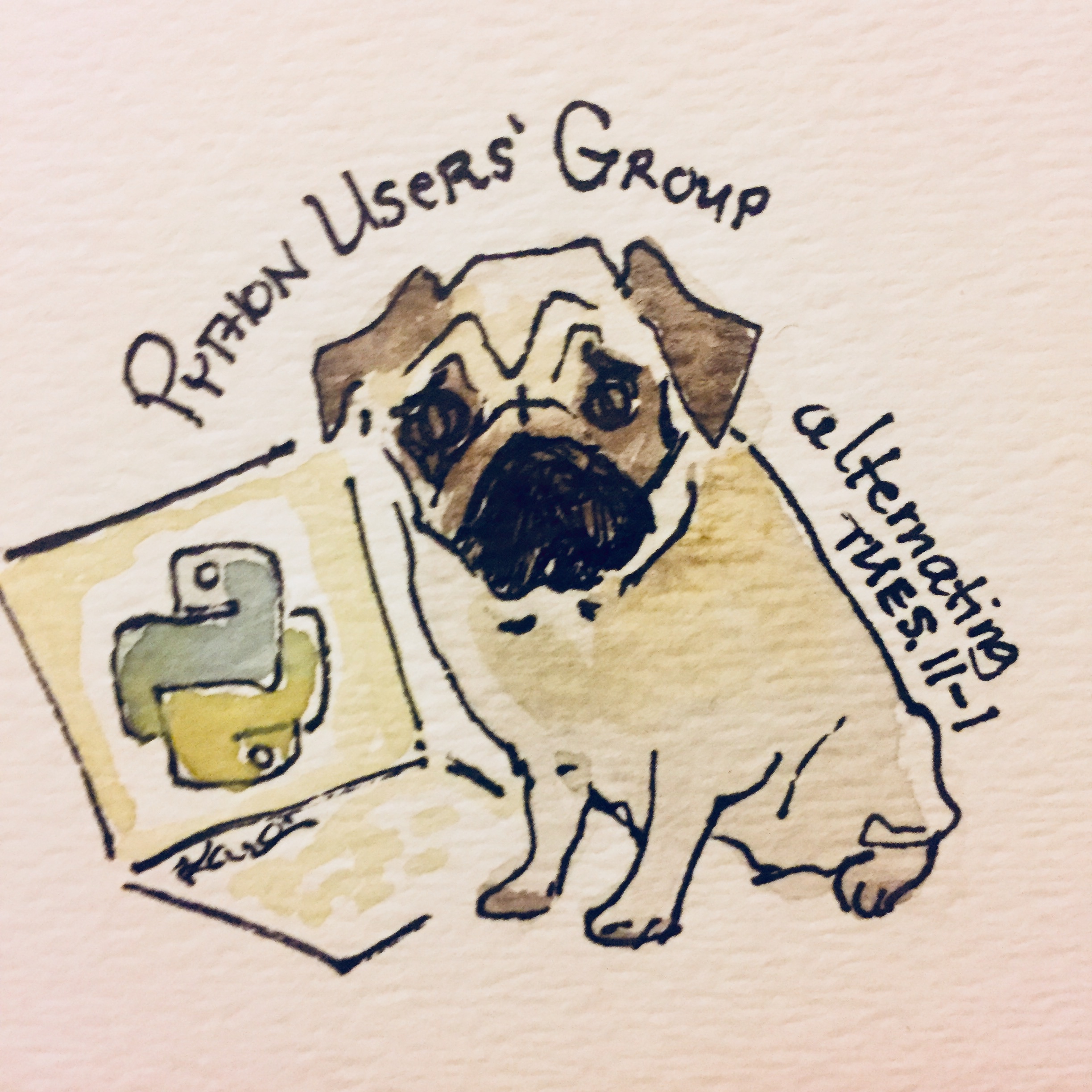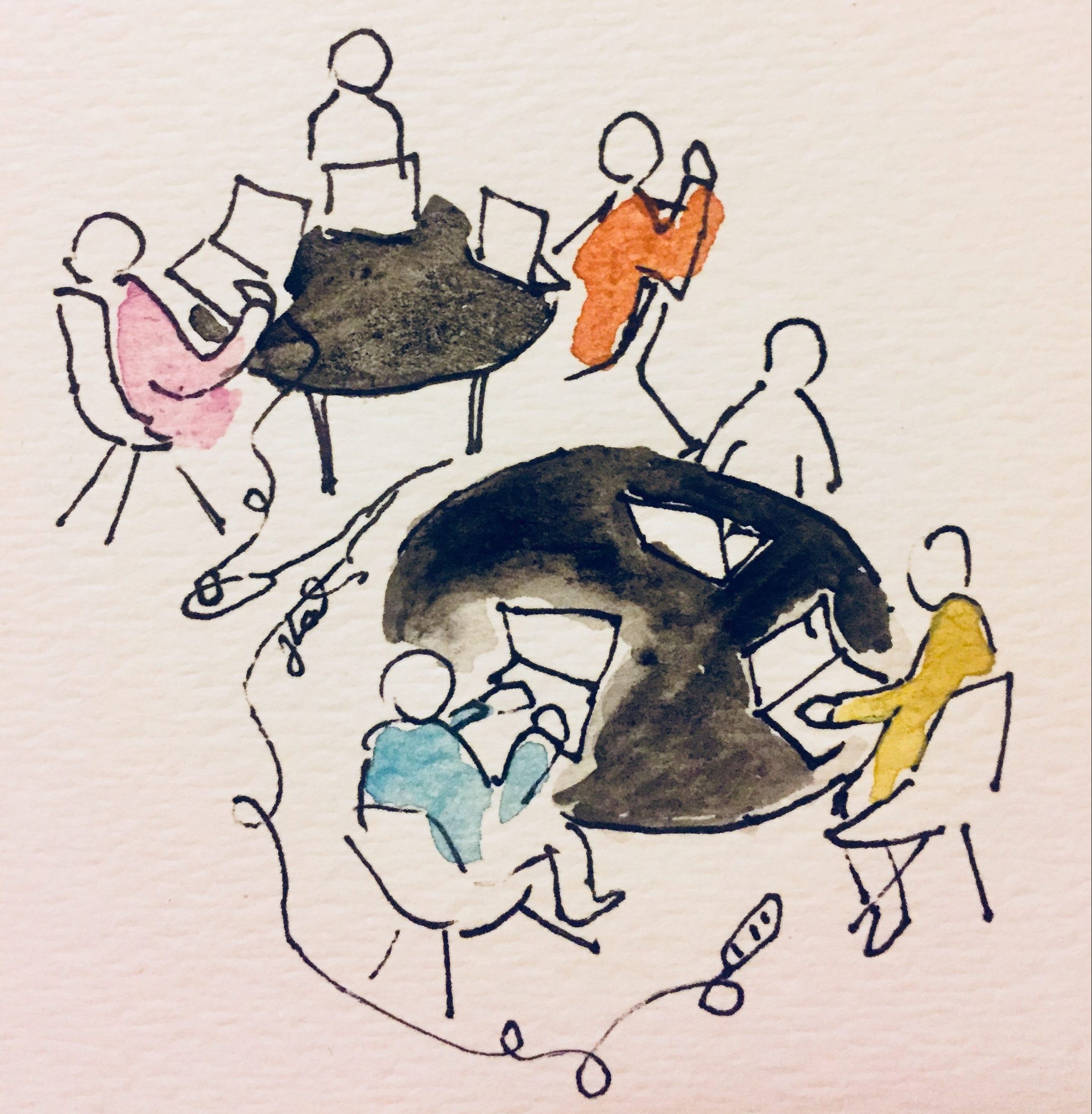Note that this blog post is revised and updated every semester, typically in early September or February. Links in this post may be outdated. For up to date information, please check the most recent “Welcome to GCDI”/”What is GCDI?”/”GCDI is Here For You!” post.
Dear Digital GC,
This post aims to review information about the GC Digital Initiatives, upcoming workshops, and useful online resources. The start of any semester can be a struggle as we try to get our feet back underneath us and our work done efficiently. The spring term can feel like a bit of an avalanche and it’s hard to know what else is available and where. The GC Digital Initiatives are here for you! Join the GCDI Group on the Commons for regular updates, follow us on Twitter (@Digital_Fellows, @cunygcdi), tune in to your department listservs, check the workshop calendar, and visit GCDI on the Academic Commons. It’s always good to know what’s going on with the GCDI, because you, yes you, are the digital GC.
The GCDI offers different types of support for digital scholarship from the weeklong skill introduction at the GC Digital Research Institute to evening workshops to afternoon skill share lunch conversations, to one-on-on consultation for faculty and students. Whether you have participated in our workshops before or your idea of the perfect software is a paperback edition, there is something for you! Our offerings are open to scholars at all levels of digital experience and at all stages of graduate research. Whether you are digitally driven, curious, or defiant, we are prepared to help.
We highly recommend you attend NYCDH Week workshops this week including the GC Digital Fellow Workshop this Thursday, Do the R Thing (Programming in R) led by Tahir Butt. This calendar will link you to the many free workshops being offered around the city this week by constituents of NYCDH. NYCDH brings together scholars across institutions (academic, public, and cultural) working in Digital Humanities. The workshops range from beginning to advanced, and the Kickoff always demonstrates the amazing breadth of possibilities of digital scholarship.
One-on-One Help
We’re piloting a new GC Digital Scholarship Lab Open House once a month with follow-up consultations by appointment. Please come to 7414 on February 27th any time from 12 to 6. For now, please contact the fellows to set up a consultation appointment
GC Digital Scholarship Lab Open House 
Join us with digital skills questions! Snacks provided!
Consultations

Personalized help is here!
Sign up online for a time that works for you, with a fellow who specializes in the skills you’d like help with or want to know more about.
Special Interest Groups
We have several groups for people with more specific skills in mind, who seek other scholars working with similar methods and tools. These groups meet in the Digital Scholarship Lab and are meant to gather common interest across disciplines.
Python Users’ Group (PUG)

Python Users’ Group (or PUG for short) is a bi-weekly, drop-in, and informal opportunity for those interested in the Python programing language to come to the GC Digital Scholarship Lab and find support. PUG is staffed by the GC Digital Fellows, who have experience with many of the most popular open-source toolkits for Python and are happy to help troubleshoot particular problems and snags that you might be experiencing. In the Spring of 2018, PUG will meet in room 7414 on alternating Tuesdays from 11am – 1pm, beginning on Tuesday, February 20th. Registration is not required, although we encourage you to bring your own laptop.
GIS Working Group
The GIS/Mapping working group serves as a community hub for CUNY students and faculty interested in the use of geographic information systems for research and/or teaching. Anyone, regardless of their expertise or knowledge of GIS and mapping tools, is welcome to join and post messages discussing their own projects and ideas, or to request support or opinions from peers. Anyone interested in joining can do so by accessing the GIS/Mapping working group on the CUNY Academic Commons.
Digitales Humanidades / DH in Spanish
An open discussion of Digital Humanities (DH) in Spanish-language contexts, both written in Spanish and/or in Spanish-speaking countries; and the geopolitics of DH and genealogies of DH outside of the US, Canada and Europe. This group is run by GCDI and the Library.
Primary Source Working Group
Primary Source provides a space for students, faculty, and staff who are interested in deep engagement with archives and special collections: for interrogating research methods, recovering histories and silences, and developing technical skills for professional experience. This working group, organized by former Digital Fellow Mary Catherine Kinniburgh, offers a space for participants with academic, professional, and creative interests in archives and rare materials to convene and collectively think through ways to enrich their work. Primary Source is also home to the Collaborative Research Seminar on Archives and Special Collections, hosted in conjunction with the Graduate Center Library and the New York Public Library, with support from Lost and Found: The CUNY Poetics Document Initiative, the Center for the Humanities, the Early Research Initiative, and GC Digital Initiatives.
Workshops

The GCDI offers hands-on workshops on digital research tools for people of all skill levels. Free and open to all. Bring your own computer, or borrow one.
This semester, we begin with:
Do the R Thing Thursday, February 8, 2018
from 6:30 PM to 8:30 PM
Python 201 Thursday, February 15, 2018
from 6:30 PM to 8:30 PM
Digital Identity and WordPress Wednesday, February 21, 2018
from 6:30 PM to 8:30 PM
Follow-up support is offered through PUG, consultations, and the Digital Scholarship Lab Open House.
Special Events
The GCDI hosts events pertinent to current trends in digital scholarship that we believe will appeal across a number of disciplines. Each year, we host a CUNY Digital Humanities Initiative (DHI) event to spotlight the many projects underway across CUNY, doc-a-thons and editathons, and an always abundant End-of-Year Showcase to present the work of Provost’s Digital Innovation Grant winners and Digital Praxis Seminar final projects. (This spring’s showcase will be Tuesday, May 15th! Mark you calendars!)
GCDI Sound Series

Join us for the GCDI Sound Series! The 2017-2018 GCDI
Sound Series #GCDISound includes talks and workshops on topics related to sound analysis, comparison, theory, production, and recording. This series explores a variety of research methods and perspectives on sound, including audio annotation and processing, oral histories and interviews, soundscapes, and DIY audio equipment. We invite scholars from all disciplines to explore ways we can study and use sound in our scholarship and pedagogy.
Field-Recording: Beyond Your Ears with Zach Poff
Tuesday, February 27th, 6:30-8:30 pm
In this talk, Zach Poff – New York area media artist, educator, and maker-of-things – will introduce “expanded” recording techniques using D.I.Y transducers to reveal hidden sounds, sonify non-acoustic phenomena, and challenge the assumption of the human listening subject recording “in the field.”
Digital Oral History
Tuesday, March 6th, 7:00-9:00 pm
Talk by Doug Boyd, who directs the Louie B. Nunn Center for Oral History at the University of Kentucky and is a national expert on oral history, archives, and digital technologies. Talk description will be announced soon.
Doing Digital Oral History with Doug Boyd
Wednesday, March 7th, 1:00-3:00 pm
This workshop will explore the multiple dimensions of the digital oral history process from interview to archive. Workshop instructor Doug Boyd directs the Louie B. Nunn Center for Oral History at the University of Kentucky and is a national expert on oral history, archives, and digital technologies. Topics included in the workshop will include project design, best practices for recording oral history (audio and video), workflows involving metadata and transcription, affordable opportunities for creating innovative access to oral histories online, as well as exploring issue pertaining to legal and ethical aspects of the oral history process.
Visit the GCDI Sound Series page for more information and other upcoming events!
GC Resources
Among the other acronyms you might see associated with GCDI are some amazing partners — the Teaching and Learning Center (TLC), the Interactive Technology and Pedagogy (ITP) certificate program, the Futures Initiative, and the New Media Lab. The GC Library also offers great digital workshops, this nifty digital tools guide, and consultation with Data and Digital Projects Librarian Steve Zweibel. The in-house Journal of Interactive Technology and Pedagogy also provides great articles and tool tips for incorporating digital methods in your teaching.
We encourage you to consult the Commons events calendar for all workshops, or check the Spring 2018 GC-Wide Workshops Schedule.
Online Resources

If you’re not physically at the GC, there are still GCDI resources you can use! These tutorials, handouts, and reflections can be extremely helpful as you consider new projects and methods. Please visit the resources page for materials by Digital Fellows old and new.
Things like:
Establishing an Academic Digital Identity: WordPress 1 by Patrick Sweeney
The mostly non-STEM guide to data literacy by Hannah Aizenman
Intro to Mapping with QGIS by Javier Otero Peña
An Anthropologist’s Visit to DHSI to Learn About Sound by Kelsey
and the entire curriculum of the GC Digital Research Insitute.
Other resources cover such topics as:
- data and databases
- design
- mapping
- programming (including python)
- project management
- projects
- text analysis
- web development
Please, don’t hesitate to contact the Digital Fellows with questions!
With best wishes for a productive semester,
your Digital Fellows,
Hannah, Tahir, Kelsey, Kristen, Jojo, Jeremy, Javier, Rachel, Patrick, and Patrick



